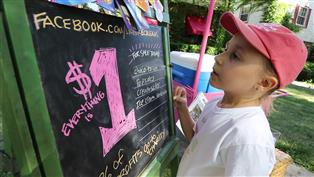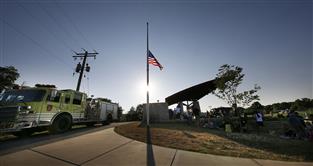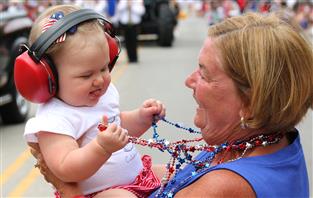Nurse honored for her role in supporting organ donation
Work is emotional, requires balance
Lisa Floeter understands the anguish of parents with a child awaiting a donor heart, liver or kidney.
Floeter, 28, also understands the anguish of parents with a child on life support - a child who could be the one giving the gift of an organ.
As a critical care nurse at Children's Hospital of Wisconsin, the Franklin woman comes in contact with both those who can donate and those who need the donation.
"I work in the ICU at Children's, and I take care of the patient before and after transplant," said the Burlington native, who studied nursing at the Fingers Lake Community College in Canandaigua, N.Y.
She works third shift, and as such, she gets to know the families as they visit their children at night, when rounds are over and the hospital is a bit quieter.
It is in those hours, she said, that she and the families form bonds, relationships that, if the time comes, help her explain about the need to donate an organ.
"The problem is, they are on life support," she said of the critically ill children. "So they look alive."
And sometimes, understandably, parents are beside themselves with the prospect of losing a child.
"People get angry, but most parents are grateful that we've done everything we can," she said.
Allowing families to choose
Floeter, who received the BloodCenter of Wisconsin's 2012 Joan Heimler Legacy of Lief Scholarship Award, said her role is not to convince families to donate an organ, but to explain the advantages and disadvantages of making that gift. The award recognizes critical care nurses who actively support organ donation, and it is named after the woman who was instrumental in starting the Wisconsin Tissue Bank, now a part of the BloodCenter.
"In the critical stages, I think I get more personal time with just the family," she said. "I don't feel I convince them, because I don't think it should be forced on them.
"We will tell them about the people who are waiting," Floeter said. "It's a gift of a lifetime."
Personal experience
Sometimes, too, Floeter will tell families why organ donation means so much to her, why she chose nursing, critical care nursing, as a career.
"My strength comes from my cousin, who was born with half a heart," she said. "He passed away at the age of 2, waiting for a heart transplant."
His name was Joshua, and that was in 2005. Two years later, Floeter, who helped care for him, graduated from nursing school.
Floeter said her work is sad when a little one loses his or her life.
"All these children have a purpose until they go to their forever home," she said.
And Joshua's legacy lives on through her work helping others understand the need for organ donation.
"Joshua wasn't meant to be here for a long time," Floeter said. "He was here to change a few lives."
Including a little boy who received a heart transplant after Floeter told another family about Joshua and then made the tough decision to donate.
More from News and Features
- Anodyne Coffee plans to open location in Wauwatosa Village
- Wauwatosa Meetings: Aug. 4
- Video: Wauwatosa girl's curbside ice cream stand raises money for the hungry
- Wauwatosa News and Notes: Hands-only CPR training offered; Firefly Art Fair is Aug. 6-7
- Wauwatosa Ask Now: Why are there barriers and fencing along the North Avenue bridges over the Menomonee River?
- Mystery Photo Contest: July 28
- Wauwatosa gears up for National Night Out event, this year at the zoo
- Election 2016: Wisconsin's 4th District candidates weigh in
- Wauwatosa's Luther Manor residents share smiles through flower delivery
- Wauwatosa Police Report: July 17-23














